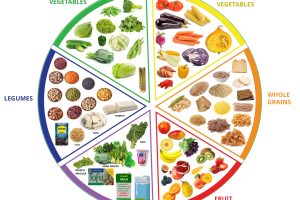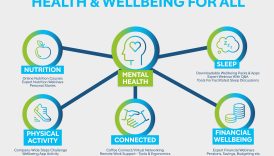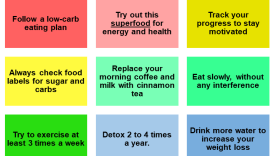The Ultimate Guide to Building a Balanced Diet

Importance of a Balanced Diet
A balanced diet is essential for maintaining optimal health and wellness. It serves as the foundation for overall well-being, helping to energize the body, boost the immune system, and support mental clarity. Imagine having a day where you feel more energized and focused – that’s the power of nourishing yourself with the right foods.
- The Ultimate Guide to Building a Balanced Diet
- Importance of a Balanced Diet
- Benefits of Building a Balanced Diet
- Identifying Nutritional Needs
- Understanding Macronutrients
- Importance of Micronutrients
- Planning Your Meals
- Creating a Weekly Meal Plan
- Tips for Balanced Meal Prep
- Incorporating Variety
- Importance of Food Diversity
- Trying New Foods
- Portion Control
- Understanding Serving Sizes
- Strategies for Portion Control
- Reading Food Labels
- Understanding Nutrition Facts
- Avoiding Hidden Sugars
- Hydration and Its Role
- Benefits of Staying Hydrated
- Tips for Increasing Water Intake
- Mindful Eating
- Paying Attention to Hunger Cues
- Avoiding Emotional Eating
- Eating Out and Social Events
- Making Healthy Choices at Restaurants
- Strategies for Healthy Eating During Social Gatherings
- Sustainable Eating Habits
- Incorporating Local and Seasonal Foods
- Reducing Food Waste
- Supplements and Their Role
- Understanding When Supplements are Necessary
- Consulting with Healthcare Professionals
- Managing Food Allergies and Restrictions
- Tips for Navigating Food Allergies
- Building a Balanced Diet with Dietary Restrictions
- XIII. Evaluating Progress and Making Adjustments
- Tracking Your Nutrient Intake
- Adjusting Your Diet for Optimal Health
- XIV. Conclusion
- Recap of Building a Balanced Diet
- Tips for Sustaining Healthy Eating Habits
Benefits of Building a Balanced Diet
The benefits of a well-rounded diet extend far beyond just physical health. Here are a few:
- Improved Mood: Consuming a variety of nutrients can uplift your spirits.
- Sustained Energy: Balanced meals help keep energy levels steady throughout the day.
- Weight Management: A nutritious diet can aid in maintaining a healthy weight.
By embracing these benefits, individuals can enhance their quality of life, reinforcing the idea that eating well is truly investing in oneself.
Identifying Nutritional Needs
Understanding Macronutrients
To build a balanced diet, individuals must first recognize their nutritional needs, particularly macronutrients. These include carbohydrates, proteins, and fats – the cornerstone of any healthy eating plan. For example, a busy parent might find that incorporating whole grains, lean proteins, and healthy fats keeps their energy levels high while juggling daily responsibilities.
- Carbohydrates: The body’s primary energy source.
- Proteins: Essential for muscle repair and growth.
- Fats: Necessary for hormone production and nutrient absorption.
Importance of Micronutrients
While macronutrients are vital, micronutrients like vitamins and minerals are equally critical for overall health. They support every bodily function, from immune response to bone health. Here’s why they matter:
- Vitamins: Boost energy and support skin health.
- Minerals: Essential for bone density and fluid balance.
Understanding both categories ensures you’re not just filling your plate, but truly fueling your body!
Planning Your Meals
Creating a Weekly Meal Plan
Once you’ve identified your nutritional needs, the next step is meal planning. A weekly meal plan helps streamline grocery shopping and ensures you’re eating a balanced diet. For instance, a working professional might find it easier to plan meals on Sunday, dedicating a few hours to outline what they’ll eat throughout the week.
- Choose Themes: Designate certain days for specific cuisines or ingredients.
- Cook in Batches: Prepare large portions that can be divided into multiple meals.
Tips for Balanced Meal Prep
Meal prep can make all the difference in maintaining a healthy diet. Here are some handy tips to consider:
- Use Colorful Ingredients: Aim to fill your plate with a variety of colors; this usually means a rich assortment of nutrients.
- Portion Meals: Use containers to store balanced portions, making it easy to grab a meal on busy days.
With these strategies, planning healthy meals becomes not only manageable but enjoyable, paving the way for a nutritious lifestyle!
Incorporating Variety
Importance of Food Diversity
After planning your meals, it’s essential to focus on variety. Food diversity is not just about making meals more interesting; it plays a crucial role in meeting nutritional needs. A wide range of foods ensures that you receive a balanced array of vitamins and minerals. For example, a friend of mine noticed a significant boost in her energy levels after she expanded her diet to include more colorful fruits and vegetables.
- Enhances Nutrient Intake: Different foods provide unique benefits.
- Prevents Boredom: Keeps your meals exciting and enjoyable.
Trying New Foods
Incorporating new foods into your diet can be a delightful adventure. Trying out exotic fruits, whole grains, or plant-based proteins can add zest to your meals!
- Experiment with Recipes: Challenge yourself to cook something unfamiliar each week.
- Visit Local Markets: Explore farmers’ markets for fresh, seasonal produce.
By embracing variety, you not only nourish your body but also savor the journey of discovering new tastes and textures!
Portion Control
Understanding Serving Sizes
Building on the importance of variety in your diet, portion control is equally essential for achieving nutritional balance. Understanding serving sizes can help manage caloric intake while ensuring you enjoy a range of foods. For instance, my colleague found that measuring her food helped her recognize the right portion sizes, making her feel satisfied without overeating.
- Visual Cues: Use your hand as a guide—like a fist for grains and palms for proteins.
- Read Nutrition Labels: Familiarize yourself with recommended serving sizes listed on packaging.
Strategies for Portion Control
Implementing effective portion control strategies can also make a significant difference in your eating habits:
- Smaller Plates: Using smaller dishes can create the visual perception of a fuller plate.
- Mindful Eating: Slow down and savor each bite, listening to your body’s cues for hunger.
By mastering portion control, individuals can enjoy their meals while contributing to overall health and well-being!
Reading Food Labels
Understanding Nutrition Facts
As you practice portion control, a crucial skill to develop is reading food labels. Understanding nutrition facts empowers individuals to make informed choices. For example, when my sister started checking labels, she realized the difference between similar products in terms of calories and nutrients.
- Calories: Keep an eye on the serving size and total calories per serving.
- Nutrients: Look for foods high in fiber and low in saturated fats.
Avoiding Hidden Sugars
Another vital aspect to consider is avoiding hidden sugars, which can sneak into various products.
- Watch for Ingredients: Ingredients like sucrose and corn syrup may indicate added sugars.
- Choose Whole Foods: Opt for natural options like fruits and vegetables over processed snacks.
By mastering the art of reading food labels, individuals can make healthier choices and support their overall dietary goals!
Hydration and Its Role
Benefits of Staying Hydrated
After focusing on food labels and portion control, another essential element of a balanced diet is hydration. Staying hydrated directly impacts overall health and well-being. For instance, when I increase my water intake, I notice improvements in my skin clarity and energy levels.
- Aids Digestion: Water helps break down food for better nutrient absorption.
- Regulates Temperature: Staying cool during hot weather or exercise is crucial for comfort and health.
Tips for Increasing Water Intake
To enhance hydration, consider these practical tips:
- Set Reminders: Use your phone or apps to remind you to drink water throughout the day.
- Infuse Flavors: Add slices of fruits or herbs to make drinking water more enjoyable.
By prioritizing hydration, individuals can significantly boost their health and support their dietary goals!
Mindful Eating
Paying Attention to Hunger Cues
Transitioning from hydration, another essential aspect of a balanced diet is mindful eating. This practice involves tuning into your body’s hunger cues, allowing you to eat when truly hungry and stop when satisfied. For example, I remember a time when I began waiting for physical hunger before reaching for a snack, leading to better meal choices and satisfaction.
- Listen to Your Body: Identify genuine hunger versus habitual eating.
- Eat Slowly: Take the time to savor each bite, enhancing your eating experience.
Avoiding Emotional Eating
Another important component of mindful eating is avoiding emotional eating. Many people, including myself, may turn to food for comfort during stressful times.
- Recognize Triggers: Keep a food journal to identify emotional patterns.
- Find Alternatives: Substitute snacks with activities like going for a walk or practicing relaxation techniques.
By embracing mindful eating, individuals can cultivate a healthier relationship with food and make more conscious choices!
Eating Out and Social Events
Making Healthy Choices at Restaurants
Building on the concepts of mindful eating, navigating dining out can pose its own set of challenges. However, it’s possible to enjoy meals while still making healthy choices at restaurants. For instance, I’ve found that reviewing the menu before going out helps me select healthier options in advance.
- Start with a Salad: Opt for a light salad to fill you up before the main course.
- Request Modifications: Don’t hesitate to ask for dressings or sauces on the side.
Strategies for Healthy Eating During Social Gatherings
When it comes to social events, strategies can help maintain your healthy eating goals.
- Eat Before You Go: Snacking on healthy foods before heading out can curb temptations.
- Focus on Conversations: Engage in discussions to keep your attention off food.
By implementing these strategies, individuals can enjoy social occasions while remaining committed to their health goals!
Sustainable Eating Habits
Incorporating Local and Seasonal Foods
Continuing from strategies for healthy eating, it’s important to consider sustainable eating habits. One effective way to enhance your diet while supporting the environment is by incorporating local and seasonal foods. I remember visiting a local farmers’ market and discovering incredibly fresh fruits and vegetables that tasted far superior to store-bought options.
- Support Local Farmers: Buying from local vendors helps sustain the community.
- Enjoy Peak Flavor: Seasonal produce is often more flavorful and nutritious.
Reducing Food Waste
Another critical aspect of sustainable eating is reducing food waste. Simple practices can make a big difference.
- Plan and Portion: Aim to buy only what you need and plan meals effectively.
- Use Leftovers Creatively: Transform leftovers into new meals to minimize waste.
By adopting sustainable eating habits, individuals can contribute to a healthier planet while enhancing their overall diet!
Supplements and Their Role
Understanding When Supplements are Necessary
As we embrace sustainable eating habits, it’s essential to recognize the role of supplements. While a balanced diet should ideally provide most of the nutrients your body needs, supplements can be beneficial in certain situations. For example, when I started a new plant-based diet, I learned that I needed extra Vitamin B12, which is harder to obtain from non-animal sources.
- Dietary Gaps: Consider supplements if you have specific dietary restrictions.
- Health Conditions: Certain medical conditions may necessitate additional nutrients.
Consulting with Healthcare Professionals
Before diving into supplements, consulting with healthcare professionals is crucial.
- Get Personalized Advice: A registered dietitian can provide tailored recommendations based on your unique needs.
- Avoid Over-Supplementation: Professionals can help you avoid consuming excessive amounts of certain vitamins or minerals.
By understanding when and how to use supplements, individuals can ensure they are supporting their health effectively!
Managing Food Allergies and Restrictions
Tips for Navigating Food Allergies
Transitioning from the discussion about supplements, it’s crucial to address managing food allergies and dietary restrictions. For those with food allergies, awareness is key. I vividly recall a friend’s experience at a dinner party where she alerted the host of her nut allergy, preventing a potential health scare.
- Read Labels Carefully: Always check food labels for allergens before consuming.
- Communicate Clearly: Don’t hesitate to inform restaurant staff or friends about your allergies.
Building a Balanced Diet with Dietary Restrictions
Building a balanced diet with dietary restrictions can be a challenge, but it’s definitely achievable.
- Substitute Wisely: Use safe alternatives like almond milk or gluten-free grains.
- Focus on Whole Foods: Incorporate fruits, vegetables, and proteins that align with your dietary needs.
By being proactive and informed, individuals can successfully manage food allergies while enjoying a diverse and nutritious diet!
XIII. Evaluating Progress and Making Adjustments
Tracking Your Nutrient Intake
Continuing from managing food allergies, evaluating progress and making dietary adjustments are crucial for maintaining health goals. Tracking your nutrient intake can be incredibly enlightening. Personally, I started logging my daily meals and nutritional values using a simple app, which helped me identify areas for improvement.
- Set Goals: Determine specific nutritional goals for better focus.
- Use Technology: Mobile apps can simplify tracking, making it efficient and user-friendly.
Adjusting Your Diet for Optimal Health
After analyzing your intake, you may need to make adjustments.
- Listen to Your Body: Pay attention to how different foods affect your energy and mood.
- Consult Professionals: Regular check-ins with a nutritionist can guide necessary changes.
By continuously evaluating and adjusting your diet, individuals can work towards achieving and maintaining optimal health!
XIV. Conclusion
Recap of Building a Balanced Diet
As we wrap up our journey through building a balanced diet, it’s important to remember the key elements we’ve explored. From understanding macronutrients and micronutrients to navigating food allergies, each component plays a vital role in achieving nutritional balance. Personally, embracing these principles transformed my approach to food and overall well-being.
Tips for Sustaining Healthy Eating Habits
To sustain healthy eating habits, consider these practical tips:
- Stay Educated: Continue learning about nutrition and adjusting to new findings.
- Meal Prep: Consistent planning can prevent impulsive, unhealthy choices.
By integrating these strategies into daily life, individuals can cultivate lasting healthy eating habits for a vibrant and fulfilling lifestyle!




